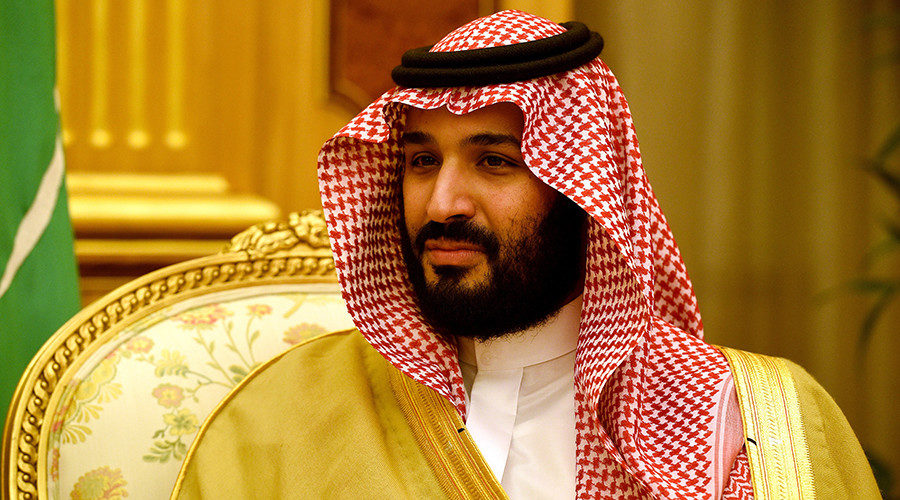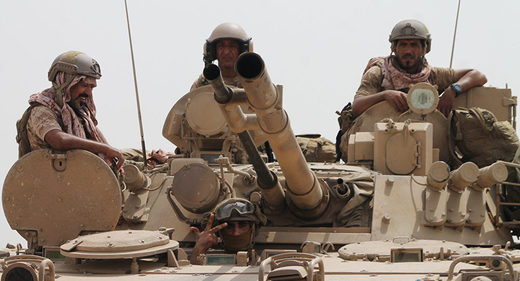In the hilarious novel by Christopher Buckley, 'Thank you for smoking,' the central character, Nick Naylor, works for Big Tobacco as a chief spokesman. The reason why Naylor, who lobbies on behalf of cigarettes using ingenious ploys, was given the job in the first place was due to a blunder he made as a journalist before, where he incorrectly announced live on air the death of the US president.
His new boss believed Naylor would be brilliant in his new job as he would have so much to prove. Indeed, in one scene Naylor even explains to schoolchildren how smoking isn't bad for your health.
It almost seems a fitting description of Saudi Arabia's new crown prince, Mohammad bin Salman. For those who are only now tuning in to the news from Saudi Arabia, King Salman, 81, gave his court a bit of a surprise when he deposed his nephew Muhammad bin Nayef of all his official duties. In his place, the king installed his son, Mohammad bin Salman, 31, as crown prince and heir apparent to the throne.
By most accounts, the young crown prince was, just three years earlier, an entirely obscure figure whose short period as defense minister was marred by several unfortunate setbacks, including billions of dollars lost in Yemen. Then there was the time he threw his weight behind an oil scheme that resulted in an oil price crash, which has left the Saudi economy decimated.
The new crown prince really does have an awful lot to prove. But that's not a good thing.
Ruthlessly ambitious and an outsider, this makes him dangerous and unpredictable, yet for Donald Trump's purposes the perfect partner to spearhead his ill-conceived campaign against Iran. Slowly, Trump's pieces are falling into place in the Middle East, and it is no surprise that the first media in the region to praise Mohammed's swift takeover of the cherished post was that of Israel.
Mohammed bin Salman has inherited a country not only at a crossroads in its contemporary history, as it struggles to unshackle itself from oil dependency, but one which appears to be suffocating under its own insecurities, foibles and paranoia. Indeed, the more the House of Saud moves, it seems, the more it appears to be in a permanent state of geopolitical dysfunction. In fact, few analysts, except perhaps for David Ignatius of the Washington Post - who was recently accused of having not an entirely healthy journalistic relationship with the Saudi elite - have failed to notice the country's blunders in the region. It's as though almost everything that Riyadh does outside of its borders just turns to ashes. Syria, Yemen and now Qatar.
Can this absurdly young, aggressive and outlandish new leader, who will take the reigns under an increasingly despondent and frail father as remaining monarch, really help his country? Or is he doomed to push it into the abyss as many regional commentators fear?
Salman has a reputation as being anti-establishment and desperate to be seen as a reformer. But his haste was his downfall in the past. Despite being hugely popular and very much seen at home as a modernist - who we should remember took away key powers from the religious police and is throwing his weight behind a modernization plan to drag the country into the 21st century - Mohammed's bold idea to thunder ahead with a military campaign in Yemen was a great error which his adversaries are only too keen to cautiously point out.
He was also a chief proponent in the 2015 decision to over produce oil in a craven attempt to financially drain US fracking companies - but which in the event failed after a few months and resulted in the oil price crash, which today has taken away much of Riyadh's clout in the region.
And it's that same region where the present king and his son believed would at least provide them with some payback, once Trump came to Riyadh and breathed new life into the kingdom.
Yet it was Prince Mohammed who led a multi-nation effort to quarantine Qatar over its ties with Iran and support for Islamist groups that Saudi Arabia and the UAE have opposed for years.
Was the Qatar crisis, which is really backfiring on the Saudis, a catalyst for the crown prince to swoop in and take the most powerful job in government or were there other factors?
It's not clear at this stage what role the Qatar fiasco played. But what is clearer is that Mohammed bin Salman, who didn't study in the West like so many of his contemporaries and speaks little English, will take a much harder line both on Qatar and more importantly Iran.
Consequently, we are almost certainly witnessing both Saudi Arabia and Iran approaching the abyss of a crisis which appears to be almost entirely crafted by Israel, Saudi Arabia and of course America. Indeed, as far as hard-liners go in Riyadh, Trump couldn't have dreamt up a Saudi leader more suited to his plans to marginalize Iran. Even if it means through military efforts in an all-out war.
But there are many factors which have rushed his arrival into office as crown prince and heir to his father, King Salman. Many believe his father's mild dementia might be developing; others point to the catastrophe of Qatar. But most of all, Iran's perceived threat - which is largely invented to use as a platform to justify a less challenging style of governance and an inflated public image among other GCC states that admire Riyadh's high defense spending - is at fever pitch.
Never have the Saudis been so up for a scrap with Iran, but paradoxically, so ill-equipped to execute it. The attack on Iran, although carried out by Al-Qaeda, is believed to have been commissioned by Riyadh. But like almost everything they do, it was also poorly timed and misjudged. The Saudis couldn't have banked on Iran sending over a bevy of missiles precisely targeting Al-Qaeda groups on the ground in Syria. Said by one Iranian commentator to be a 'slap' for Saudi Arabia, the message was clear. We can hit your proxies. And if you persist, we can use the same precision missiles against you on your own soil.
But the strike must have been music to the ears of those in Riyadh and Washington who actually want a tangible justification to begin a military campaign against Iran.
Prince Mohammad is not interested in diplomacy with Iran, as he has recently stated quite clearly. And few believe he will change his views on how to deal with the Iran problem.
"It is not really a question of if but rather of when a new escalation with Iran starts,"said Olivier Jakob, managing director of consultant Petromatrix GmbH, as quoted by Reuters. "Under his watch, Saudi Arabia has developed aggressive foreign policies and he [Crown Prince Mohammed] has not been shy about making strong statements against Iran."
Indeed, his capricious style, which has led his critics to label him as "brash" and one who "starts wars on a whim" is a clear point in his favor to those who helped install him. For it is no accident that a series of bizarre meetings in Washington between Trump's Middle East experts and Adel al-Jubeir, the highly articulate foreign minister, assisted by officials from the UAE followed by the bizarre provocation in Tehran all point to one thing: his appointment is not solely down to his father's wishes, but from regional powers - in particular, Israel - which believes that King Salman's son will recognize the Jewish state and open the floodgates of business for the Israelis.
The crown prince is not merely ambitious. I am told he is ready to do anything to take the Saudi throne when ultimately his father's health wanes, a claim supported by journalist Jamal Elshayyal of Middle East Eye.
He is a creation of Washington and Tel Aviv and the recent terrorist attack in Tehran [on June 7, two terrorist attacks were carried out in the Iranian capital, one on the parliament building, and the other at the Mausoleum of Ruhollah Khomenei, which left 17 civilians dead and 43 wounded], designed to accelerate the process of his passage to supreme power, under the guise of Trump and Netanyahu.
Qatar threatened to cloud this process of promoting debate, which questioned the fallacious threat of Iran and so needed to be dealt with quickly. Almost certainly the new crown prince will adopt a much tougher strategy against Qatar that may result in a standoff against Hamad bin Khalifa Al Thani, the emir of Qatar.
What we are witnessing in Saudi Arabia is not only a cataclysm of rules of dynasty and power, but an intense polarization of the Middle East which is only heading in one direction. Trump's defense secretary Jim 'Mad Dog' Mattis may be alone in warning others in the White House about the perils of fighting Assad's army in Al-Tanf in Syria, but he seems to have signed off a blueprint for a war with Iran - presumably to garner a wave of military spending from the cabal of Muslim countries, a subject Trump alluded to during a speech in Riyadh.
But naked ambition, seized upon by other players in the region, might throw the kingdom further into turmoil. There's a huge amount of gambling going on simply to give the young crown prince his dream of the Saudi throne, which includes a shake up of the intelligence apparatus and a new 28-year-old US ambassador in Washington.
If you think the Qatar plan was whacky, hold on to your seats for the Iran sequel. We're all in for a rough ride, and it's hard to see after Riyadh's demise both in Yemen and Syria that its own forces will fare well against Iran's. Even if a coalition of Muslim countries steps up, who is going to lead such a vanguard of its closest allies? Could it be that, like Qatar, there has been a miscommunication between Riyadh and Washington and the new crown prince is expecting US forces to take on the task?
If that is the case, Mohammed's dispatch from the corridors of power might be as speedy as his entry, if Trump cannot rein him in and keep him from starting a war with Iran. Otherwise, we may need someone like Nick Naylor to explain to our children what went so disastrously wrong in a movie entitled, 'Thank you for bombing.'
Martin Jay is an award winning British journalist now based in Beirut who works on a freelance basis for a number of respected British newspapers as well as previously Al Jazeera and Deutsche Welle TV. Before Lebanon, he has worked in Africa and Europe for CNN, Euronews, CNBC, BBC, Sunday Times and Reuters.






Reader Comments
to our Newsletter